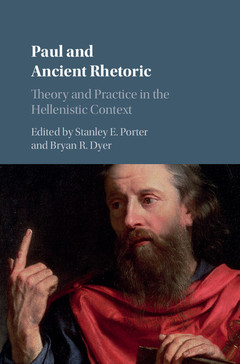Paul and Ancient Rhetoric Theory and Practice in the Hellenistic Context
Langue : Anglais
Coordonnateurs : Porter Stanley E., Dyer Bryan R.

In this volume, major international scholars examine ancient rhetoric's role in understanding Paul and his writings within his Hellenistic context.
The Apostle Paul lived and breathed in a Hellenistic culture that placed high value on the art of rhetoric, and recent advances in rhetorical criticism of the New Testament have resulted in a new emphasis on the rhetorical aspect of his letters. As many scholars have pointed out, however, it is not clear to what extent ancient rhetoric actually influenced Paul and his writing or how important rhetoric is for interpreting the Pauline corpus. This volume, containing contributions from major figures in the field, provides a nuanced examination of how ancient rhetoric should inform our understanding of Paul and his letters. The essays discuss Paul's historical context, present innovative advances in and trenchant critiques of rhetorical theory, and offer fresh readings of key Pauline texts. Outlining the strengths and weaknesses of a widely used approach, Paul and Ancient Rhetoric will be a valuable resource for New Testament and Classics scholars.
Paul and ancient rhetoric: an introduction to a continuing discussion Stanley E. Porter and Bryan R. Dyer; Part I. History of Scholarship and Key Issues: 1. Can the theory of rhetoric help us to understand the New Testament, and in particular the letters of Paul? Carl Joachim Classen; Part II. Paul, his Education, and First-Century Culture: 2. Paul in Tarsus: historical factors in assessing Paul's early education Andrew W. Pitts; 3. Hellenistic rhetorical education and Paul's letters Christos Kremmydas; 4. Paul and traditions of Graeco-Roman rhetoric Frank W. Hughes; 5. Ancient literate culture and popular rhetorical knowledge: implications for studying Pauline rhetoric Stanley E. Porter; Part III. Issues in the Use of Ancient Rhetoric in Analyzing Paul's Letters: 6. 'Delivery, delivery, delivery': accounting for performance in the rhetoric of Paul's letters Glenn Holland; 7. Rhetoric and epistolography - case not closed Lauri Thurén; Part IV. Paul and Ancient Rhetoric in Practice: 8. Paul, classical rhetoric, and oracular fullness of meaning in Romans 1:16-17 Robert G. Hall; 9. 'I do not understand what I do': a challenge to understanding Romans 7 as prosopopoeia Bryan R. Dyer; 10. Parenesis and peroratio: the rhetorical function of Romans 12:1-15:13 Mark D. Given; 11. Navigating First Thessalonians employing Aristotle's enthymeme Thomas H. Olbricht and Stanley N. Helton; 12. Appeals to logos, pathos, and ethos in Galatians 5:1-12: an investigation of Paul's inventio David A. deSilva; 13. Visualizing Philippians: ancient rhetorical practice meets cognitive science through sociorhetorical interpretation L. Gregory Bloomquist.
Stanley E. Porter is President, Dean, Professor of New Testament, and Roy A. Hope Chair in Christian Worldview at McMaster Divinity College. He is the author of more than twenty books, including Linguistic Analysis of the Greek New Testament: Studies in Tools, Methods, and Practice and When Paul Met Jesus: How an Idea Got Lost in History (Cambridge, forthcoming).
Bryan R. Dyer is coeditor, with Cynthia Long Westfall, of The Bible and Social Justice and, with Stanley E. Porter, of The Origins of the Synoptic Gospels. He has written numerous articles and chapters on Paul's letters, the Epistle to the Hebrews, and the Gospels.
Bryan R. Dyer is coeditor, with Cynthia Long Westfall, of The Bible and Social Justice and, with Stanley E. Porter, of The Origins of the Synoptic Gospels. He has written numerous articles and chapters on Paul's letters, the Epistle to the Hebrews, and the Gospels.
Date de parution : 02-2016
Ouvrage de 346 p.
15.8x23.5 cm
Thème de Paul and Ancient Rhetoric :
© 2024 LAVOISIER S.A.S.



